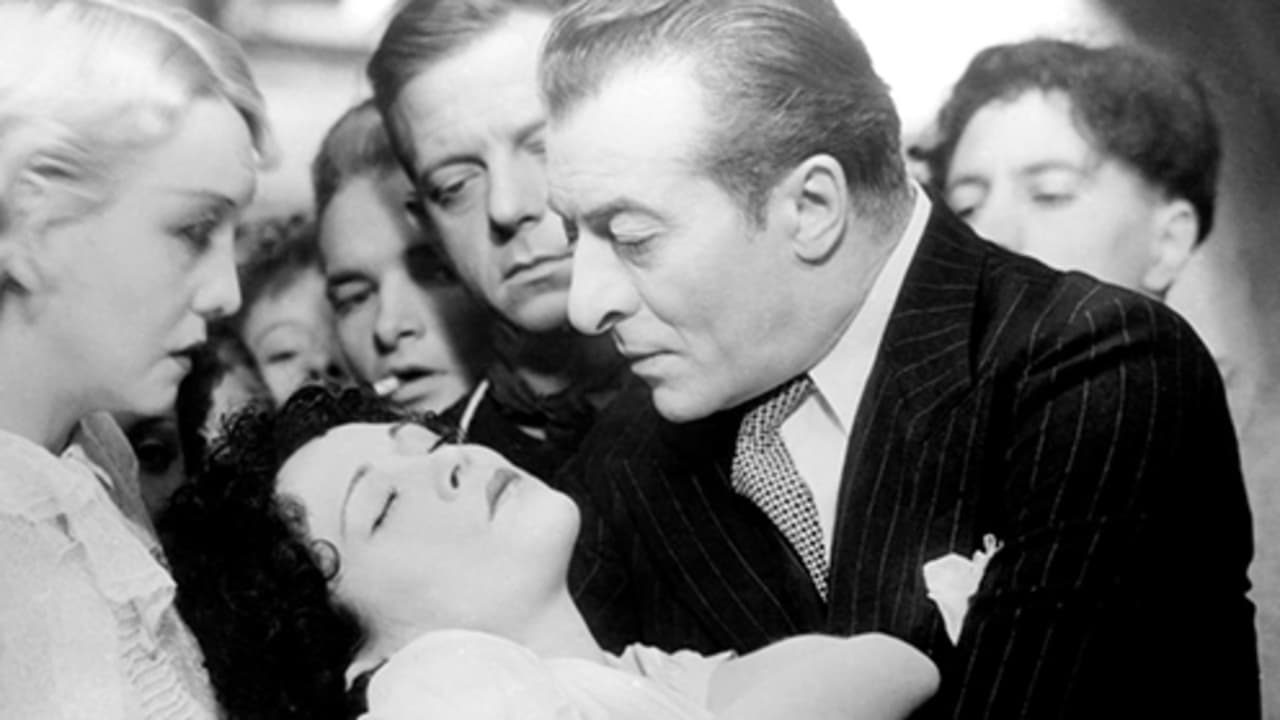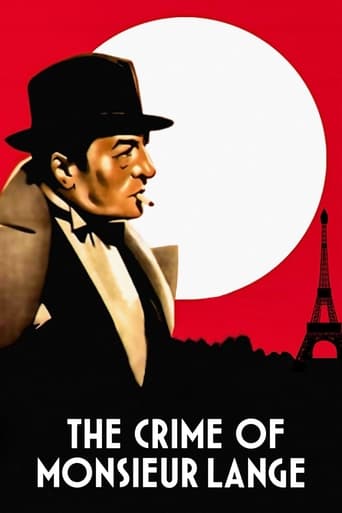Freaktana
A Major Disappointment
Abegail Noëlle
While it is a pity that the story wasn't told with more visual finesse, this is trivial compared to our real-world problems. It takes a good movie to put that into perspective.
Lela
The tone of this movie is interesting -- the stakes are both dramatic and high, but it's balanced with a lot of fun, tongue and cheek dialogue.
Cristal
The movie really just wants to entertain people.
roger-212
One of the greatest (almost) lost films I've seen is Jean Renoir's "The Crime of Monsieur Lange." Renoir made it in 1936, prior to the invasion of France by German forces, and just before his two wartime masterpieces "Rules of the Game" and "Grand Illusion," which both have overshadowed it critically and in terms of popularity. But I consider "Lange" to be richer in irony, political bite, and even humanity than its more famous followers.It relates the story of one Amedee Lange, a pulp writer for a weekly paper, published by the womanizing and ever scheming Batala, played with delicious gregariousness by Jules Berry. Lange writes the continuing western serial "Arizona Jim" for the paper, but his prose suffers the indignity of having advertising blurbs inserted into it to by Berry. When Berry, in an effort to avoid creditors, fakes his own death in a train wreck, Lange and the other workers for the paper rally and take over the publishing themselves, creating a popular and commercial success, continuing "Arizona Jim," sharing in the tasks and rewards, and even staging a (rather stagy and unconvincing) film version of the western for the local cinemas.Renoir creates a potent political subtext by defining this community - the workers, neighbors, and friends - around a single courtyard. His camera glides through doorways and peers through the windows of apartments and shops to eavesdrop on all the personal and professional intrigues (in a way that at the time was considered outrageously overdone). Lange himself has never been outside Paris, and when people comment on the apparent "authenticity" of his western serial, he constantly corrects them - but to no avail. He is soon taken for the lover of the laundress whom his bed-ridden friend has a crush on, another misunderstanding. Lange's a fake – but he barely suspects as much, as he's too concerned with trying to explain, facilitate his friends, or going along for the ride to ever express much more than a sense that he finds the situation ironic. His misunderstood, almost aggressively passive existence becomes the catalyst and center of this self-forming community, a new populist collective that's practically communist.When Berry unexpectedly returns (dressed in a priest's outfit he's appropriated), he intends to reap the benefits of the commune's success publishing and filming the serial. Lange realizes Berry's capitalist worldview and intent to dictate over them again threatens the well-being of the community, indeed will destroy it. After a drunken party that night (in which Marcel Lévesque gives a speech, in a way reprising his role as the good-hearted sidekick in Feuillade's 1917's "Les Vampires"!) Lange leaves Berry's office and the camera follows him outside through the windows of the office. With a bravura camera pan of a full 360 degrees to take in all the elements around the central courtyard (considered quite self-indulgent then, but now practically invisible to our jaded eyes) Renoir returns to Berry, who's now lying on the cobblestones bleeding - Lange has stabbed him – off-screen - yet the camera move signifies a profound emotional event has transpired and transformed the community...Lange was made during the period that the Popular Front was gaining political ground in France, when there was optimism that people could band together and conquer the threat that Hitler was manifesting. Renoir's political themes have always been background texture rather than text – "The Rules of the Game" is considered one of the best anti-war films ever made and yet the topic is never brought up in the film. Even "Grand Illusion," taking place in prisoner-of-war camps, concerns itself primarily with the class-based relations between the Germans and their captured prisoners.Lange's positioning as the reluctant center and catalyst for the commune, as well as its inadvertent savior (by eventually committing murder, the "crime" of the title), is played in ironic set-ups. Berry is dressed as a priest for his ignoble return. Earlier Berry mentions to a priest on the train he "must be able to get away with anything" and this returning sheep in wolf's clothing is another resonance with how people put up fronts that are misunderstood. The film also manages to address, redolent in its subtext, the vagaries of pop culture, verisimilitude of representation, and personal responsibility. (None of the handful of pregnancies in the picture seem to enjoy the benefit of being in wedlock – it's likely that Berry is responsible for all of them).My favorite moment occurs at the train station, when Berry is about to flee the office for the first time. He's saying goodbye to one of his smitten secretaries (who doesn't realize what a cad he truly is). Renoir allows Berry a moment of wisdom as he tells her how to capture the sympathies of some passing young man (speaking perhaps from personal knowledge) so she won't be lost, abandoned, once he leaves her - by suggesting she pretend to cry over a departing lover on the station platform. Indeed, as Berry's train leaves, her sobs capture the attention of a passing man, whom she begins to walk with. The shot fades out with the hint of a slight smile on her face as she begins to warm to her new conquest. Amazing.Truffaut called "Monsieur Lange" Renoir's greatest work. The film was issued by Interama on laserdisc in 1988 (now way out of print of course). It was recently issued on VHS from Kino, now OOP as well, and could use a Criterion-grade upgrade and reissue.
irritable
It is a mistake to view this as a crime movie. The crime aspect is just a symbolic summary of the theme that Renoir developed in this movie.Essentially, this movie was about unbridled capitalism, personified by Batala, vs. the commutarianism of the publishing house after he "died".The "new era" at the publishing house was one of unbridled happiness and prosperity. Under Batala, the workers were starving while the boss was stealing and screwing people.My only disagreement with Renoir was that he spent too little time on the good times after Batala was gone, and too much on how Batala was a criminal. But perhaps he needed this to demonize him as well as he did.We know where Renoir's sympathies were since the protagonists get away in the end. A symbolic death of unbridled capitalism.
MartinHafer
This film was a tiny bit predictable, otherwise it would have earned a 10. The story is about a decent but meek French man who writes cowboy stories (though he has never even been to the American West). He has no dream of having them published but feels a strong need to put his fantasies on paper. This is sort of a vicarious thrill for him because apart from his stories, his own life is rather dull and he is a failure with the ladies. Eventually, his sleazy boss who owns a magazine discovers his stories and agrees to publish them. Of course, being sleazy, there is a catch and the nice main character is, for a while, being used by this creep. However, where the story goes from there and how it goes there is intriguing and make this a must-see film.
The_Void
Jean Renoir is one of the classic French directors and films like La Grande Illusion and The Human Beast show that. This film, The Crime of Monsieur Lange, is not one of the man's best films; but it's still a more than adequate example of French film-making in the 1930's. Adapted from a story by Jean Castanyer (the same man that wrote the story for Renoir's earlier film 'Boudu Saved from Drowning'), The Crime of Monsieur Lange tells the story of a man and woman that bed down in a hotel for the night. The man is recognised by the patrons as being the same man that killed another man, but before they can turn him in; the woman decides to tell the story of exactly why her man is a murderer and then let the customers decide whether or not he should be convicted. This premise offers an interesting base for a film, as themes of justice and morality can easily be tied in; but this is the film's main problem. While Renoir presents the story behind the murder in an interesting way, we never really get into whether or not the protagonist should be convicted.The film is left open ended, probably so that the audience can 'make their own minds up' about the events; but this idea is never really explored and it's a shame because it could have presented a very interesting backbone for the movie. Quite what Renoir's intentions were for this film, therefore, are rather quite muddled. The film is never exciting enough to be considered a straight thriller, the story isn't deep enough for it to be a deep and complex drama, and we're not presented with enough themes for it to be viewed as a cross section of justice and morality. Jean Renoir seems to have been too much of a complex man to have simply intended this film as a quick Saturday-morning style drama, and themes of living in France at the time aside, that's pretty much what this is. The actual drama in the film is good, however, with the actors giving life to their characters through realistic acting. Renoir's direction is as assured and as vivacious as ever, and you really get the impression with this man that he really puts his back into making films. This certainly isn't a bad movie; but it's not great either. Most people, like me, would probably expect a little more from Renoir...but it's still worth seeing.

